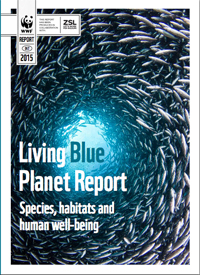
DAVID ADAMS reports on a new WWF report which “amplifies the warning siren” on the decline of marine species around the world…
Almost half of the world’s marine mammals, birds, reptiles and fish have been lost since 1970 with some fish species declining by almost 75 per cent, according to a new report from WWF.
The WWF’s Living Blue Planet Report shows that coral reefs, mangroves and seagrasses have also shown steep declines – with human actions including overfishing, habitat destruction and climate change the biggest drivers.

The WWF report which “amplifies the warning siren” for the world’s oceans
WWF Australia CEO Dermot O’Gorman, said: “In the space of just one generation, human activity has severely damaged the ocean by catching fish faster than they can reproduce while also destroying their nurseries…”
“The world is in a race to catch fish that could end with people starved of a vital food source and an essential economic engine. Overfishing, destruction of marine habitats and climate change can have dire consequences for the entire human population, with the poorest communities that rely on the sea getting hit fastest and hardest.”
The report, the work of the WWF and the Royal Zoological Society of London, tracked 5,829 populations across 1,234 species.
Other key findings show:
• that there has been a 74 per cent drop in fish populations belonging to the family that includes tunas, mackerels and bonitos;
• that around one in four species of sharks, rays and skates is now threatened with extinction thanks primarily to overfishing;
• that 29 per cent of marine fisheries are overfished;
• that tropical reefs have lost more than half of their reef building corals over the past 30 years;
• that nearly 20 per cent of the world’s mangroves were lost between 1980 and 2005; and,
• that more than five trillion plastic pieces, weighing more than 250,000 tonnes, are currently in the sea.
The report notes that nearly billion people rely on fish as a major source of protein and that fisheries and aquaculture assure the livelihoods of 10 to 12 per cent of the world’s population, generating total economic benefits of at least $US2.5 trillion a year.
It also shows that just 3.4 per cent of the ocean is protected, with only part of this area effectively managed, and says increasing this protected area to 30 per cent of the world’s oceans could generate up to $US920 billion between 2015 and 2050.
Writing in the report, Marco Lambertini, director general of WWF International, said while WWF reports on the state of the planet’s health every two years, they decided to “amplify the warning siren for the ocean this year, because the situation is urgent and the moment to act is at hand”.
He said commitments to prioritise a healthy ocean in the post-2015 sustainable development agenda – with the UN’s Sustainable Development Goals expected to be approved by world leaders at the United Nations in New York City later this month – “must be backed by tangible investment in restoring and sustainably managing marine resources.”
“The pace of change in the ocean tells us there’s no time to waste,” he wrote. “These changes are happening in our lifetime. We can and we must correct course now.”
~ www.worldwildlife.org/publications/living-blue-planet-report-2015






